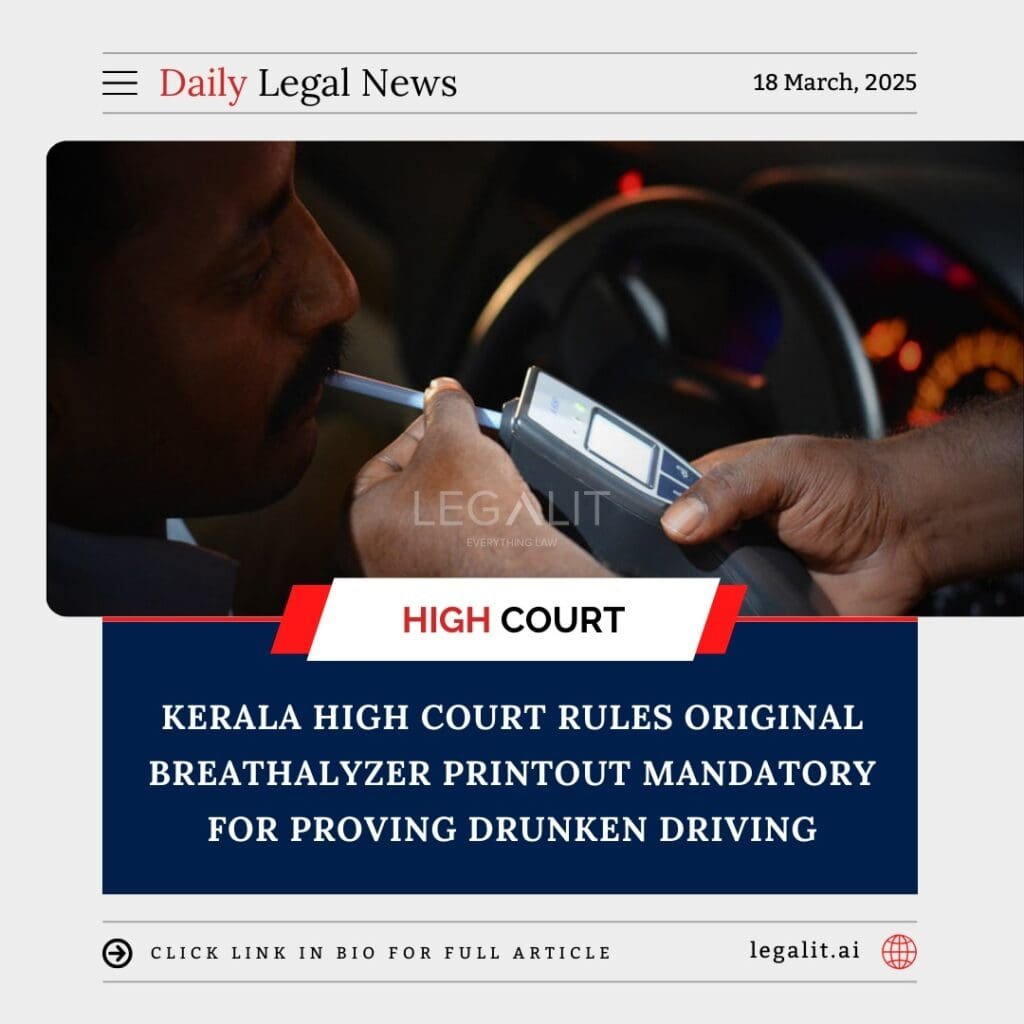
Background
The Kerala High Court has ruled that to establish a case of drunken driving, law enforcement must produce the original printout from the breathalyzer machine used during the test. The decision comes as a significant clarification on the evidentiary requirements in cases of driving under the influence (DUI) and sets a new standard for how such cases should be prosecuted in the state.
The case arose after a driver challenged the charges of drunken driving filed against him, arguing that the police had failed to submit a physical printout of the breathalyzer test as evidence. Instead, the prosecution relied on oral testimonies and manually recorded data, which the defense contended was insufficient to conclusively prove intoxication beyond reasonable doubt.
Court’s Rationale
The High Court, in its ruling, emphasized that proper procedural compliance is necessary to uphold the fairness of law enforcement actions. The judgment was based on the following key observations:
- Need for Scientific and Concrete Evidence
- The court held that in DUI cases, a scientific approach is crucial, and mere verbal claims by the police or handwritten entries in records cannot substitute for a machine-generated printout. The breathalyzer machine provides an objective measurement of blood alcohol concentration (BAC), and its printout serves as the primary documentary proof of intoxication.
- Protection Against False Accusations
- The judgment recognized the possibility of false or exaggerated allegations if original evidence from the breathalyzer is not presented. It noted that without an authentic printout, there remains a risk of tampering, errors, or misrepresentation in recording BAC levels.
- Compliance with Legal and Procedural Standards
- The court pointed out that as per Indian law, including provisions under the Motor Vehicles Act and relevant rules, DUI cases require evidence that meets a scientific threshold. Law enforcement agencies must ensure that breathalyzer test results are documented and submitted in a legally admissible format.
- Impact on Convictions
- The ruling makes it clear that in the absence of an original printout, the prosecution’s case may not stand in court. This effectively raises the burden on law enforcement agencies to ensure that breathalyzer machines used during traffic enforcement are fully functional and capable of generating printouts.
Implications of the Judgment
- For Law Enforcement – The police must now ensure that breathalyzer tests are conducted using machines that generate a physical printout. Officers cannot rely solely on manual recording of readings or verbal confirmations of intoxication.
- For Accused Individuals – Those charged with drunken driving can challenge cases where the police fail to submit a breathalyzer printout as evidence. This provides additional legal protection against wrongful convictions.
- For Legal Proceedings – The ruling establishes a higher evidentiary standard for DUI cases in Kerala, requiring law enforcement agencies to follow proper protocols while collecting and presenting evidence in court.
Conclusion
The Kerala High Court’s decision reinforces the importance of scientific proof in legal proceedings related to drunken driving. By making the original breathalyzer printout a mandatory piece of evidence, the court aims to ensure that DUI cases are handled with greater accuracy and transparency. This ruling not only strengthens legal safeguards for individuals accused of drunken driving but also compels law enforcement agencies to adopt best practices in evidence collection and case documentation.